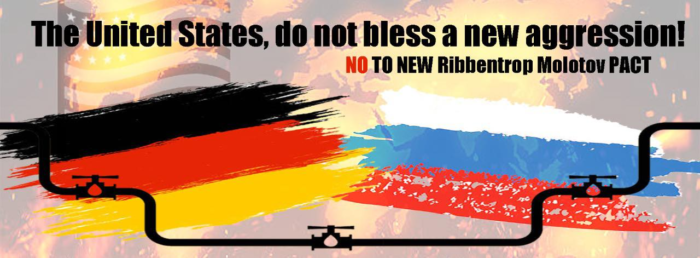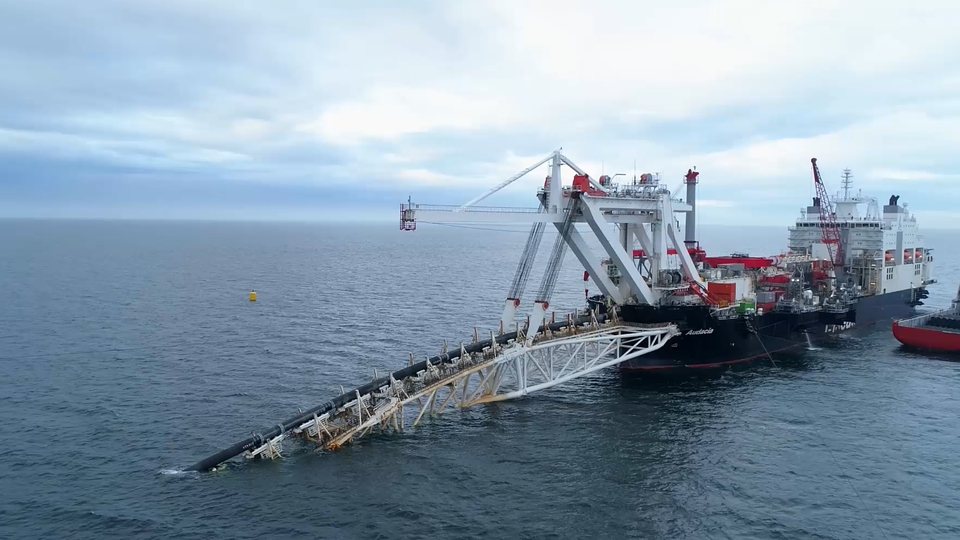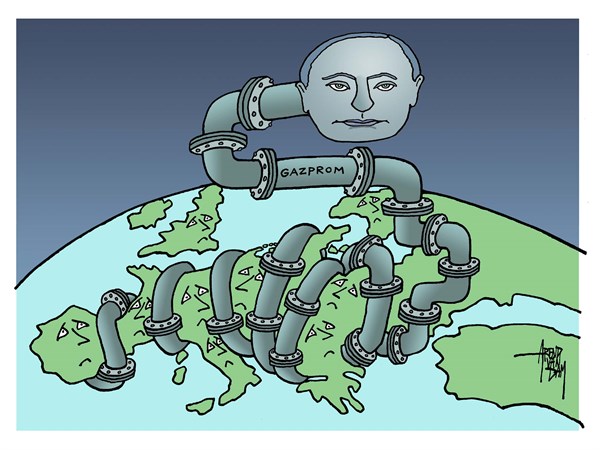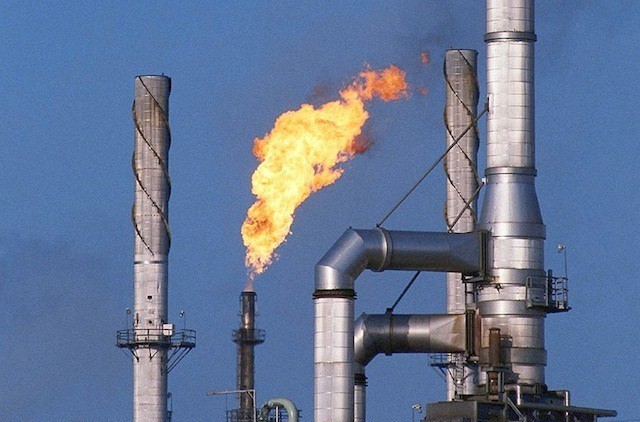The agreement, released on the evening of 21 July, gives the green light to finish the construction of the controversial pipeline, providing Ukraine vague assurances of support if Russia would attempt to use energy as a geopolitical weapon.
It comes months after President Biden waived sanctions against the company overseeing construction of the gas pipeline which would allow Russia to supply Europe with natural gas avoiding Ukraine’s transit system after years of the country’s attempts to stop the project from moving forward.
Applauded by the Kremlin, this deal has sent shockwaves throughout Ukraine. Security experts have denounced it as a deal that undermines Ukraine’s security, likening it to a second “Budapest Memorandum,” an international agreement that had infamously failed to prevent a Russian invasion in 2014.
While a US State Department spokesperson claimed that Poland and Ukraine were involved in the talks around the deal, the Ukrainian MFA denied having been invited to any negotiations around the draft. This means that the crucial deal compromising Ukraine’s security was concluded over Ukraine’s head, dashing a principle of Ukraine’s foreign policy in the era of the war against Russia, “nothing about Ukraine without Ukraine.”
Despite POLITICO having reported, referring to four sources in the Biden administration, that the White House asked Kyiv not to make noise about the agreement, Ukraine is vocal in stating its opposition to the deal.
Ukrainian Foreign Minister Dmytro Kuleba has asserted that Ukraine wants “stronger formulations” for questions of security in the German-US deal and released a joint statement with his Polish counterpart, vowing to oppose the deal until
“solutions are developed to address the security crisis created by NS2, to provide support to countries aspiring to membership in Western democratic institutions, and to reduce threats to peace and energy security.”
In addition, POLITICO stated that USA officials called on their Ukrainian counterparts not to bring up the matter within Congress.
This claim was contested by a senior official from the White House and Derek Chollet, the Counselor of the United States Department of State, who denied that the USA exerted pressure on Ukraine in an interview with RFE/RL:
“Ukraine is a democratic country, it has its own voice. We strive for a close and constructive partnership with our Ukrainian friends. One in which we would uphold our common interests and values.”
Yet, the White House has pushed Ukrainian President Zelenskyy’s visit to the US from July to the August recess, impeding his capabilities of engaging senators to oppose Nord Stream 2, which lends credence to the POLITICO claim.
The White House pushed the visit from July to the August recess.
President Zelensky won't be able to engage members of Congress, who on a bipartisan basis oppose Biden's surrender to Putin on Nord Stream 2.
Probably just a coincidence. https://t.co/jRsEj2Auiu
— Ted Cruz (@tedcruz) July 21, 2021
Vague assurances
The Washington-Berlin agreement stipulates that if Moscow attempts “to use energy as a weapon or commit further aggressive acts against Ukraine,” Germany would undertake unspecified national measures and initiate EU-level actions, “including sanctions,” to restrict Russian energy exports.
As well, in it, Germany vows to attempt to influence Russia to extend Ukraine’s gas transit agreement with Russia, which ends in 2024, for ten more years. This gas transit earns Ukraine $1.5 bn annually and is seen as a security guarantee, the logic going that if Russia is dependent on Ukraine to sell gas to the EU, it will avoid acts of full-blown aggression that will affect its gas sales.
As well, Germany and the US undertake commitments to set up a Green Fund for Ukraine to promote its energy transition, energy efficiency, and energy security.
Notably, the deal is mum on the specifics of what measures should be taken should Russia continue using energy as a political weapon, as it has been doing for many years.
A high US official told Bloomberg that the ambiguous language of the deal had a goal of obscuring the course of action the US would take if Russia were to undertake aggressive actions towards Ukraine. At the same time, as Senator Jim Risch (R-Idaho) noted on Tuesday, the US-Germany statement
“is full of promises and assurances but offers little in the way of meaningful measures to address the key national security threats Nord Stream 2 poses to US allies and interests.”
Not only the form but also the substance of the accord is problematic. Security experts have compared it to the 1994 Budapest Memorandum obliging Kyiv to abandon nuclear weapons in the exchange for “security assurances” from Russia, the UK, and the US, who had vowed to respect Ukraine’s sovereignty and territorial integrity.
Just like the US-Germany future agreement, this document failed to specify the specific action to be taken should Ukraine become a victim of aggression.
“Pledges to support Ukraine in case of Russian aggression worth the same as assurances in Budapest Memorandum,” wrote Daniel Szeligowski, Head of Eastern Europe Programme & Senior Research Fellow on Ukraine at the Polish Institute of International Affairs.
So here's the NS2 deal: Germany provides Ukraine with money which Kyiv spends on buying green technologies from German companies, and Zelensky finally visits White House. Pledges to support Ukraine in case of Russian aggression worth the same as assurances in Budapest Memorandum
— Daniel Szeligowski (@dszeligowski) July 21, 2021
The lack of guarantees was also noted by economist Timothy Ash, who suggested the deal be called “Budapest Memorandum 2”:
Apparently the Germans want to provide cast iron guarantees to Ukraine over the supply of gas from Russia to offset concerns over NS2, apparently they are going to call them the Budapest Memorandum 2. https://t.co/7cKca3hwAv
— Timothy Ash (@tashecon) July 14, 2021
Yet the circumstances Ukraine finds itself in are much direr than in 1994: it is now in the eighth year of resisting the imperial ambitions of its aggressive neighbor with the threat of a kinetic war always looming on the horizon.
Janis Kluge, an analyst at the German Institute for International and Security Affairs, has also noted the lack of guarantees, calling the deal a “big win for Gazprom”:
#Berlin gets the green light for #NordStream2 in return for practically nothing. #Germany also backtracks on its guarantees for Ukrainian transit ("try to ensure" - we know how that ends). Big win for #Gazprom and support for Putin's #Ukraine policy. https://t.co/tKAdxNhpUu
— Janis Kluge (@jakluge) July 21, 2021
“America is not back”

Ukrainian activists like Chairwoman of Democracy in Action: Zero Corruption Conference Hanna Hopko and executive director of the Anti-Corruption Action Center Daria Kaleniuk did not hold back their disappointment at the decision, taking aim at President Biden's announcement that "America is back" as he sought to heal ruptured ties with allies.
After this statement we in Ukraine can say that America is not back! Very disappointed ! Strategic corruption is flourishing! https://t.co/fJEqVExHMH
— Hanna Hopko (@HopkoHanna) July 21, 2021
A good lesson for Ukraine from President @POTUS and Merkel that democratic values and international order don’t matter if the West wants to have business with authoritarian regimes. NS2 is a blow to the global fight with kleptocracy. America is not back unfortunately.
— Daria Kaleniuk (@dkaleniuk) July 22, 2021
Hanna Hopko, who had earlier served as Foreign Affairs Committee Head of the Ukrainian Parliament, clearly stated the reasons why the accord is devoid of legal certainty.
First, it doesn’t address national security, strategic corruption, or Russian malign influence threats posed by Nord Stream 2. Second, it fails to urge the Kremlin to change behaviour toward the Transatlantic community. Last but not least, the document leaves undetermined the concrete actions Berlin must take to counter Putin.
One of the provisions of the agreement is that the parties would facilitate investments of $1 bn (Germany would commit to an initial $175 million investment) in a Green Fund to assist Ukraine in its transition to cleaner sources of energy. Hanna Hopko and Mykhailo Gonchar, President at Centre for Global Studies “Strategy XXI,” both agree that $1 billion appears miserable compared to Russia’s estimated gain from the Nord Stream 2.
In this context, Ms. Hopko recalled in her remarks for Euromaidan Press:
“When we, together with MEP Andrius Kubilius, back in 2017-2019 years asked for a Marshal plan for Ukraine, we asked for $5 bn per year for economic development. And now we will be deprived of the gas transit possibility through the Ukrainian territory, and this is almost a $1.5-2 bn revenue. That is, if we make calculations for the next 50 years of the Nord Stream 2 operation, taking a minimum of $1.5 bn per year, we can say that around $70 bn should be guaranteed to us. So, we do not see any security guarantees or economic compensation.”
This guarantee may or may not be implemented, as the fund collects private investments, Honchar said in an interview with Euromaidan Press. Hence, such a safeguard, like all the others, is discretionary.
Moreover, the draft text of the agreement published by Bloomberg specified that the deal would not allow for the renewal of US sanctions against Nord Stream 2, which were waived by President Biden in May 2021. . Although this clause did not make it to the final text, Mr. Honchar stated it could be part of the unofficial agreement, and referred to this item as “icing on the cake,” stating that,
“the Kremlin, without being a party to this agreement, keeps popping the champagne… as Germans and Americans will guarantee immunity to corrupt flows of the Kremlin in Europe and the US and the existence of another shelter Russian security service officers under the care of Matthias Warnig [the Managing Director (CEO) of Nord Stream AG].”
German chancellor Angela Merkel, in her comment on the emerging deal, spoke that there is “a number of instruments, which for the most part are not on the German but on the European level, that we can implement.” Yet, it is still not clear and we don’t know if it will ever be, how the West can ensure guarantees for Ukraine.
Ms. Hopko is skeptical about the real assurances the West can grant Ukraine. She said, referring to the conflict exacerbation in spring:
“The Russian escalation and military buildup by the border with Ukraine, such an unprecedented case, should have stimulated that in the NATO summit Ukraine would receive a Membership Action Plan. And Western countries should have demonstrated solidarity. But that did not happen.
Or, Germany, dominating in the EU, could advance Ukraine’s status in its progress towards membership in the EU.
Other security guarantees could be bilateral security treaties between Ukraine and the US and between Ukraine and Germany. Additionally, allocating weapons to Ukraine now, such as Patriot surface-to-air missile systems. We have received Javelins, but this is not enough. With regard to the sea, this could be enhancing naval forces. With regard to Russia’s possible launching of airstrikes, an entire list of aerial weapons to defend Ukraine exists.”
Details aside, the key rationale revealing the failure of the accord to secure guarantees for Ukraine is that Kyiv’s voice was not taken into consideration in its negotiating and drafting processes. This led to the conclusion of an unequal agreement with the “desubjectivation” of Ukraine.
“The policy of appeasement appears to have been behind the Washington-Berlin agreement. All of Ukraine’s arguments regarding climate and environmental issues were ignored. The White House turned a blind eye even on the Capitol that had for many years approved numerous laws imposing sanctions on the Nord Stream 2. For Biden, this may be inter alia a solution to geopolitical issues, such as combating China. But this is done at the cost of Ukraine, as it gives Putin financial opportunities and strengthens his influence. Choosing benefits over values is dangerous. And not only for Ukraine,” said Hanna Hopko.
Congresswoman Marcy Kaptur (D-Ohio), who has Ukrainian heritage, expressed her support for Central and Eastern Europe against Nord Stream 2. In an address to the Congress, she recalls the “history key lesson: when Germany and Russia collude, the people of Eastern and Central Europe pay the price.”
I stand with our allies in Central and Eastern Europe against Nord Stream 2. The Congress must reject any deals that fail to protect transatlantic security and Ukraine's sovereignty. pic.twitter.com/eXCQRvtW5l
— Marcy Kaptur (@RepMarcyKaptur) July 20, 2021
Marcy Kaptur urged Congress to turn down any decisions that fail to protect transatlantic security and Ukraine's sovereignty.
Ukraine's actions
But for Western officials who have a strong stance with regard to Ukraine, like Ms. Kaptur, it is important to see that Ukraine itself is undertaking action.
Some have already been taken. Kyiv and Warsaw have issued a joint declaration vowing to oppose the pipeline. Additionally, Foreign Minister Dmytro Kuleba has demanded formal talks with Brussels and Berlin on the pipeline, invoking a clause of its agreement with the EU on political association and economic integration.
The Ukrainian Parliament’s foreign affairs committee has drafted a statement calling on the EU and the US to stop the deal (translation here), declaring that “This Russian pipeline threatens the national security not only of Ukraine but also of the whole Europe.”
Parliamentary speaker Dmytro Razumkov has also sent an open letter to US Speaker of the House of Representatives Nancy Pelosi, imploring the US Congress to continue a policy of sanctions against Nord Stream 2.
Hanna Hopko says Kyiv could take additional measures to address the situation with the pipeline.
First, the country should build a stronger coalition with Poland and the Baltic states. These countries have been vocal in opposing the project: the heads of parliamentary committees in Latvia and Lithuania expressed concern that the pipeline will increase Russian military presence in the Baltic Sea. Additionally, Lithuanian Foreign Affairs Minister Gabrielius Landsbergis has called the deal "a mistake."
Second, Ukraine should resort to immediate action on different levels, such as convoke an extraordinary session of the National Security and Defense Council to work out different scenarios, of the Parliament -- to develop Ukraine’s requests for the collective West not to sponsor Putin’s future terrorist acts such as MH17 and to demand Russia allow the flow of Turkmen gas to Europe. The Committee on Foreign Affairs must send letters to mobilize the international community.
It was most likely a strong Russian-German lobby in the White House circles to have pushed the US President to allow for the Nord Stream 2 construction, presenting it as a solution to geopolitical issues, such as combating China, Mr. Honchar told. It has paralyzed the US sanctions regime and the idea of a moratorium on the pipeline advocated for by the Green Party in Germany.
Another possible reason for the US-German agreement is that President Biden sees his main geopolitical goal as restoring the transatlantic unity that took a blow under President Trump and for this, removing the irritants in relations with Europe, such as sanctions against companies building Nord Stream 2, is a priority.
Related:
- What Europe can learn from Ukraine’s gas woes with Russia
- How Ukraine can still defeat Nord Stream 2
- Two keys to defeating Nord Stream 2 lie in Poland
- Seven reasons why the USA and EU lost to the Nord Stream 2 lobbyists
- What the US-German deal on Nord Stream 2 promises Ukraine
- US-Germany Nord Stream 2 agreement — a victory for Russia
- Strategic corruption: the new hybrid weapon against the West
- After Nord Stream-2: how Ukraine can protect its gas transit
- Mitigating the Nord Stream 2 impact on Ukraine
- Biden may lose ability to play around with Nord Stream sanctions: interview with Lana Zerkal
- Time to stop Nord Stream 2 now: open letter by Ukrainian politicians, leaders





